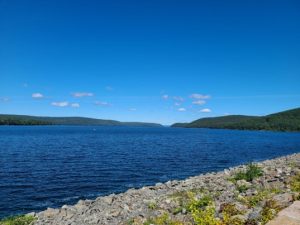Amanda Carneiro Marques is a PhD candidate in Environmental and Water Resources Engineering, co-advised by Emily Kumpel and Christian Guzman. She shared with us her experiences as a grad student at UMass.
What’s your background?
I got my bachelor’s degree in Water Resources and Environmental Engineering at Federal Fluminense University, Brazil. During my undergraduate studies, I had the opportunity to spend a year at Roger Williams University (Rhode Island, US), where I got a minor degree in Sustainability Studies. After that, I completed my master’s degree in Civil Engineering, focused on Water Resources Management, at Rio de Janeiro Federal University, Brazil. During my master’s studies, the focus of my research was sustainable water resources planning under climate change. I also worked full-time at a water treatment and distribution company and at a watershed management agency in Brazil. I worked in several projects involving partnerships with environmental conservation agencies in Brazil and in the US during all these years. I would say that my background is very related to water planning and management, water quality assessment, and sustainable water supply. My main purpose was always trying to help with the need of providing safe and reliable water to people, taking into account different environmental and social aspects that are related to the diverse context of distinct communities.
What made you want to do a PhD?
I am very passionate about research, I am a very curious person, and I love to constantly learn new things. I also know that not everyone has the same access to educational opportunities like this. I was motivated to do the PhD because I believed it was a way to use my skills to work towards making science more accessible, equitable, collaborative, and inclusive to a broader community.

Why did you want to do research with Dr. Kumpel and Dr. Guzman?
When reading about their research and talking to them, I realized that our interests aligned and that we shared similar ideals. I believe that the most important thing when choosing an advisor and mentor is to understand that you have similar purposes for your research. Both of them work towards providing safe water access to the community and to make science more inclusive, and sharing those interests is very important for me to feel motivated to continue to overcome research challenges and academic barriers.
What made you want to come to UMass?
I was very enthusiastic about the Environmental and Water Resources Program at the Civil and Environmental Engineering Department here at UMass. The courses were very interesting and presented broad perspectives on several topics. I also really liked how the faculty was interdisciplinary, and how they collaborate with each other to get different perspectives on how to deal with environmental issues and advance science. I really like cooperative environments and to be in a place where I feel my insights are appreciated.
Can you describe your research?
My research is related to assessing water quality in a water supply watershed. I analyze surface water quality data to characterize contaminants’ seasonal patterns and to identify potential sources of pollutants through land use assessment. It also includes the investigation of contaminant transport, potential pollutant pathways, and surface-groundwater interactions using environmental tracers and stable isotopes to understand the dynamics of a given constituent and how persistent this pollutant is in the natural environment, supporting the water management and decision-making process. I also use reservoir water quality modeling as a tool to evaluate how changes in management and conservation strategies would impact a drinking water supply watershed.

What advice do you have for someone considering research or graduate school?
I would say that graduate school is an exquisite opportunity for learning, exchanging experiences, developing skills, and getting new perspectives. I would also say that not always it is an easy process and that there are a lot of challenges to be overcome along the way. It is important to be truthful to yourself, understanding your limitations, and working with people to overcome barriers. There is an excellent community of people ready to talk through your problems and help you to find solutions. Sharing concerns, asking for help, and connecting with others is extremely important to keep your mind engaged and your projects moving forward. And lastly, I would say to try to enjoy the process instead of focusing only on the final goal because it is an extremely interesting experience.
